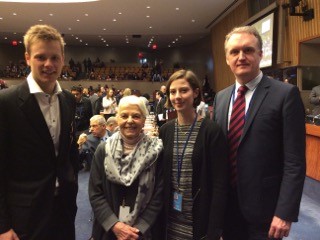 Group 3 member Renate Heinischflanked by German representative BMFSFJ Mark Kamperhoff and German UN Youth Delegates Katharina Buch and Eric Klausch (from right to left)
Group 3 member Renate Heinischflanked by German representative BMFSFJ Mark Kamperhoff and German UN Youth Delegates Katharina Buch and Eric Klausch (from right to left)
|
Renate Heinisch (DE) Group 3 member, consultative representative (BAGSO) at the UN took part at the 55th Session of the Commission for Social Development
|
 Group 3 member Renate Heinischflanked by German representative BMFSFJ Mark Kamperhoff and German UN Youth Delegates Katharina Buch and Eric Klausch (from right to left)
Group 3 member Renate Heinischflanked by German representative BMFSFJ Mark Kamperhoff and German UN Youth Delegates Katharina Buch and Eric Klausch (from right to left)
|
|
The fifty-fifth session of the Commission for Social Development (CSocD55) took place at the United Nations Headquarters in New York from 1 to 10 February 2017. "The Commission for Social Development is in charge of the follow-up to and implementation of the Copenhagen Declaration and Programme of Action of the World Summit for Social Development and meets annually. It covers key social development themes, such as poverty, employment and social integration, and the issue of youth falls within the latter. The priority theme of the fifty-five session was "Strategies for eradicating poverty to achieve sustainable development for all". Youth played an important role in this years session with one of the three high-level panel discussion focused on "Promoting Integrated Policies for Poverty Eradication: Youth Development in the 2030 Agenda". Furthermore the youth resolution was negotiated and adopted at this years CSocD" Pre-meeting of Civil Society Forum -The Social Protection Floors took place Monday, January 30 - Tuesday, January 31, 2017 United Nations HQ. The Civil Society Forum has been planned by the NGO Committee for Social Development in joint sponsorship with UN-DESA Division for Social Policy and Development.This Forum has been organized to prepare civil society participants to engage at the 55th Session of the Commission for Social Development (1-10 February, 2017 at UNHQ in New York) as well as in ongoing discussions related to implementation of social protection, including floors, at national and local levels. This space is to create an inclusive dialogue to foster cooperation between Member States, Civil Society and the United Nations. Speakers are invited to address and critique the Commission's two-year focus on "Strategies for the eradication of poverty to achieve sustainable development for all" and, specifically, how social protection can help fulfil this objective. The aim is that, at the end of these two days, participants had developed concrete recommendations for the Commission, honed their understanding of the relationship between poverty eradication and social protection, and been galvanized to engage meaningfully both with governments in New York, and at the grassroots. The statement in the 2030 Agenda for Sustainable Development that poverty is "the greatest global challenge facing the world today" has rightfully caused the international community to ask questions about its root causes and stubborn persistence. Understanding genuine causes and solutions to the various poverty traps demands a dispassionate and objective reflection on the inadequacies of longstanding development policies and practices, and calls for innovative structural and systemic changes. Similarly, situating development at the heart of the UN Agenda calls for a new understanding of the role of the state as an enabler of 'a world free of poverty, hunger, disease and want, where all life can thrive.' At one time defined by a shared ethnic identity, and at others defined by border, by language, or even by the authorized use of force, the State must now be defined as the catalyst of the transformative and participatory change envisioned in the 2030 Agenda. The concept of protecting at risk or vulnerable citizens is rooted in the recognition of the equal moral worth of all members of society - in short, it puts people at the center and leaves no one behind. Statement delivered by H.E. Mr. David Mansfield, Deputy Permanent Representative of the Mission of Malta to the United Nations. "Sustainable development has since long been at the heart of the European project. The EU Treaties give recognition to its economic, social and environmental dimensions which should be addressed together. The EU is committed to development that meets the needs of the present without compromising the ability of future generations to meet their own needs. A life of dignity for all within the planet's limits that reconciles economic prosperity and efficiency, peaceful societies, social inclusion and environmental responsibility is at the essence of sustainable development. The 2030 Agenda will further catalyse a joined-up approach between the EU's external actions and its internal policies, including in the area of poverty eradication and the fight against social exclusion, as well as the work for inclusive and sustainable economic growth, employment and decent work for all." |